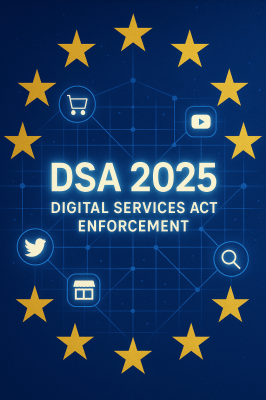EU Digital Services Act (DSA) Enforcement in 2025: What Businesses Need to Know
Introduction
The European Union’s Digital Services Act (DSA) represents one of the most ambitious attempts to regulate the digital economy. After its adoption in 2022, the law entered into force gradually, but 2025 marks the year of full enforcement across all EU member states. The DSA sets strict rules for online platforms, search engines, and marketplaces, aiming to create a safer and more transparent digital environment.
1) Who Is Covered by the DSA?
The DSA applies to a wide range of digital services, but responsibilities differ depending on size:
-
Very Large Online Platforms (VLOPs): Platforms with over 45 million monthly active users in the EU (e.g., Facebook, TikTok, Amazon).
-
Very Large Online Search Engines (VLOSEs): Search services with similar user reach (e.g., Google, Bing).
-
Smaller Platforms & Marketplaces: Required to ensure basic transparency, user reporting tools, and cooperation with regulators.
2) Key Requirements for Businesses
-
Illegal Content Removal: Platforms must react swiftly to remove illegal content once notified.
-
Transparency in Algorithms & Ads: Users must know why they see certain ads or recommendations.
-
Systemic Risk Assessments: VLOPs must assess and mitigate risks like disinformation, hate speech, or threats to elections.
-
Data Sharing with Regulators: Independent researchers and authorities gain access to platform data for oversight.
3) Enforcement in 2025
-
Regulators: The European Commission directly oversees VLOPs and VLOSEs, while national Digital Services Coordinators supervise smaller services.
-
Penalties: Non-compliance may result in fines up to 6% of global annual turnover.
-
Real-Life Cases: In 2024, the Commission launched investigations into TikTok and X (Twitter) for failing to meet transparency and child protection standards—2025 will bring more such enforcement actions.
4) Impact on Businesses
-
Big Tech: Must invest heavily in compliance teams, algorithm transparency, and data-sharing frameworks.
-
SMEs: Smaller platforms have lighter obligations but must still provide reporting tools, clear terms, and transparency in ads.
-
Opportunities: Businesses that adapt early can build consumer trust and gain a competitive edge.
5) Consumer Rights Under the DSA
-
Safer online environments with stricter moderation of harmful and illegal content.
-
Transparency in targeted advertising and recommendation systems.
-
Stronger complaint mechanisms and the right to challenge platform decisions.
6) Global Implications
The DSA is not just a European law—it sets a global precedent. Regulators in the U.S., U.K., Australia, and Canada are monitoring closely, and many are drafting similar frameworks. Businesses outside the EU that serve EU users must also comply, making this a worldwide issue.
7) 90-Day Compliance Checklist for Businesses
-
Days 1–30: Conduct internal compliance audit.
-
Days 31–60: Update content moderation systems, transparency dashboards, and advertising disclosures.
-
Days 61–90: Train staff, finalize risk assessments, and prepare reporting procedures for regulators.
Conclusion
The Digital Services Act (DSA) enforcement in 2025 marks a turning point in digital regulation. Platforms that fail to comply risk heavy penalties, while those that adapt will benefit from consumer trust and long-term growth. The DSA represents a new era of accountability, transparency, and safety in the global digital landscape.
